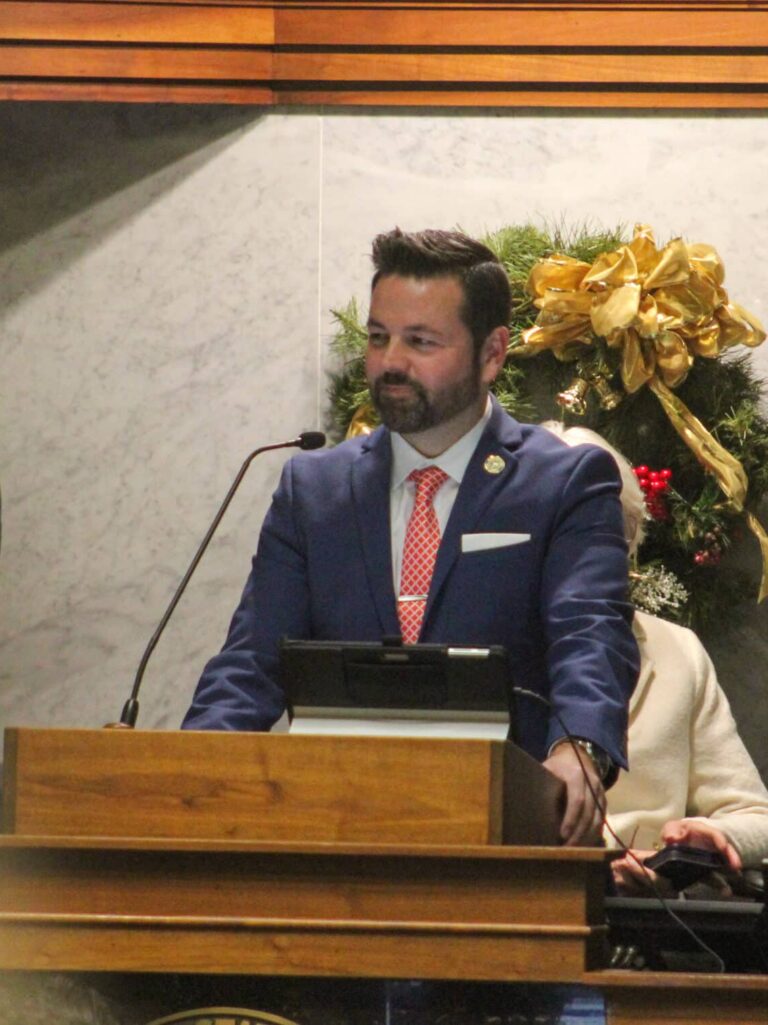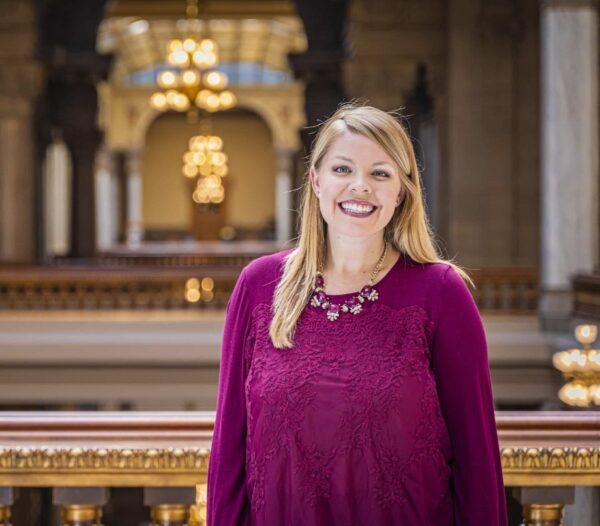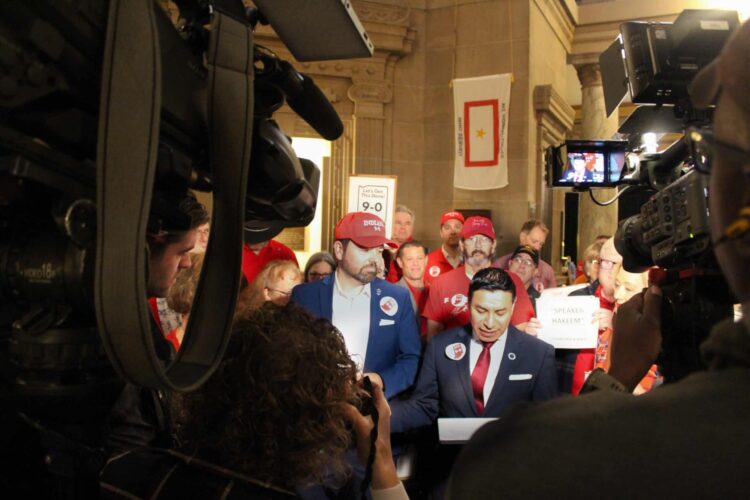
By Sydney Byerly
The Indiana Citizen
November 26, 2025
Lt. Gov. Micah Beckwith could hold unusual influence as Indiana lawmakers return to the Statehouse starting next week to consider a mid-decade redraw of the state’s congressional districts.
Beckwith was one of the earliest statewide officials to publicly support revisiting the congressional maps, publicly aligning with President Donald Trump and pro-Trump conservative influencers who pushed the idea well before Gov. Mike Braun and other top Indiana Republican officials.
He’s been part of a campaign to pressure lawmakers, supporting primary challengers to Republican senators who opposed revisiting the state’s congressional maps. His visibility grew further on Organization Day, when he joined Secretary of State Diego Morales at a small Statehouse rally urging the state House and Senate to approve maps intended to give Republicans, who currently hold seven of the state’s nine congressional seats, a chance to sweep all nine. Beckwith framed the issue as a chance to deliver “a map the people deserve” and encouraged supporters to push senators to return before the end of the year.
Now, Beckwith is poised to play a potentially crucial role, presiding over the state Senate – which is set to gather on Dec. 8 despite Senate President Pro Tem Rodric Bray, R-Martinsville, saying a week ago that supermajority Republicans don’t have enough votes to pass new maps. If the Senate’s vote is tied, 25-25, Beckwith would cast the tie-breaking vote.

“This is a real moment for Beckwith to show he has political muscle,” said Laura Merrifield Wilson, associate professor of political science at the University of Indianapolis. “He’s charismatic, he’s outspoken, and he has already shown he can win over people — remember, Mike Braun did not pick him as his lieutenant governor, but Republican delegates chose him anyway.”
Beckwith’s position at the center of a debate that has fractured the GOP comes as he enters his second legislative session presiding over a Senate where his relationship with the top Republican, Bray, is already strained. Earlier this fall, The Indiana Citizen reported that the tension dates back to February, when Bray issued a rare written reprimand after Beckwith posted on social media during active Senate floor sessions — a breach of decorum for presiding officers and members.
The two are now at odds on redistricting. Bray initially resisted reconvening the Senate, claiming that the party doesn’t have enough votes to pass new maps. On Organization Day earlier this month — usually a procedural, low-stakes vote — Senate Republicans split 19–19 on what Bray described as a proxy measure for whether to return early to take up redistricting. With 19 GOP senators resistant or undecided, Senate leaders will need at least six to flip for any map to pass.
Shortly after House Speaker Todd Huston, R-Fishers, announced this week that the House would meet Dec. 1, Bray reversed course, scheduling the Senate to gather Dec. 8 to vote on any map the House had approved
Wilson noted that Indiana’s 40–10 Republican majority usually makes ties nearly impossible. But this fight is unusual in both timing and intensity.
“It’s difficult to imagine that senators who are adamantly opposed are suddenly strongly in favor,” Merrifield Wilson said. “But those on the fence, or those who haven’t gone on the record — those are the ones the lieutenant governor can appeal to.”
Beckwith has leaned into the role publicly and privately. He has urged constituents on social media to contact state senators in support of redistricting — a strategy Wilson describes as “outsider pressure.” At the same time, she said he’s likely using an “insider” strategy as well: meeting with individual lawmakers and party leaders to make the case privately.
Beckwith has also taken on public-facing battles unusual for the office, including opposing a school referendum in Avon this fall. Compared with predecessors Sue Ellspermann and Suzanne Crouch – who each served as lieutenant governor to Govs. Mike Pence and Eric Holcomb, respectively – Merrifield Wilson said, Beckwith has been “a lot more proactive and publicly engaged.”
In a statement responding to the House and Senate decisions to reconvene, Beckwith posted: “I am happy that both chambers have finally agree to do their job after Governor Braun called a special session. I look forward to session in December and a 9-0 map!”
The Indiana Citizen reached out to Beckwith and his office with questions about his role for the special session and on the topic of redistricting, but they did not respond.

Beckwith is not the only source of pressure. Trump has demanded that lawmakers return and deliver a 9–0 Republican map. Vice President JD Vance has visited Indiana twice. National conservative groups, including Club for Growth and a new group staffed by Trump campaign veterans, have run ads urging action.
Several senators have received violent threats, including swatting incidents, since the debate intensified — threats Braun’s office called “credible.” Merrifield Wilson said such threats rarely change lawmakers’ minds.
“Historically, political violence is not effective,” she said. “If anything, it makes lawmakers dig in their heels.”
More typical sources of influence — governors, lieutenant governors, interest groups, and party leaders — are far more likely to sway votes.
“Politics is deeply relationship-focused,” Merrifield Wilson said. “If you’re neutral or conflicted on a policy, what else do you care about that leadership or the lieutenant governor could help with? Those conversations happen all the time.”
The House meets Dec. 1, though it has not yet released a proposed map. The Senate follows Dec. 8. Legislative leaders say starting the 2026 session early will allow them to finish earlier than usual, by late February.
If Senate Republicans cannot secure enough support, Trump’s push for mid-cycle redistricting would stall. But if the chamber is split, Beckwith could suddenly become one of the most consequential figures in the Statehouse.
“This is an opportunity for him,” Merrifield Wilson said. “And it will show whether he can wield political capital when it matters most.”
Sydney Byerly is a political reporter who grew up in New Albany, Indiana. Before joining The Citizen, Sydney reported news for TheStatehouseFile.com and most recently managed and edited The Corydon Democrat & Clarion News in southern Indiana. She earned her bachelor’s in journalism at Franklin College’s Pulliam School of Journalism (‘Sco Griz!).
The Indiana Citizen is a nonpartisan, nonprofit platform dedicated to increasing the number of informed and engaged Hoosier citizens. We are operated by the Indiana Citizen Education Foundation, Inc., a 501(c)(3) public charity. For questions about the story, contact Marilyn Odendahl at marilyn.odendahl@indianacitizen.org.